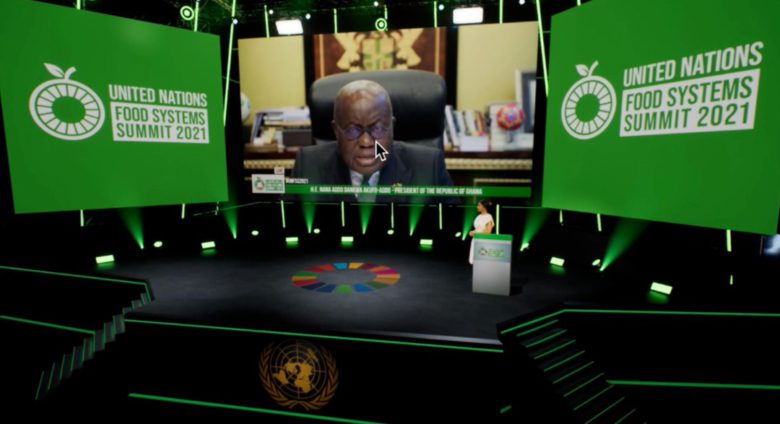President Nana Akufo-Addo has assured the United Nations Food Systems Summit of Ghana's commitment to adequately support the country's agricultural sector to ensure food security.
Addressing the summit on Thursday, he said his government will also provide the necessary leadership to fashion out appropriate policies to ensure zero hunger.
"I commit to providing the requisite leadership to strengthen food systems governance, including the integration of these commitments into our planning and budget cycle," he said.
He also committed his government to "ensuring policy, legal and institutional coherence; multisectoral and inter-ministerial coordination and sustainable financing of underfunded areas of the food system."
The president also committed to increasing women's involvement in the agriculture index by 20%. He additionally committed to supporting increased production of fruit and vegetable production by expanding the proportion of land area under irrigation from 24% to 30%.
The president also committed to promoting seed security, breed security and land security for Ghanaian farmers, especially women and youth in agriculture. He assured there will be the generation of the correct data and research to monitor progress over time.
The Food Systems Summit was held on Thursday and Friday in New York and virtually was charged with launching bold, new actions to help deliver progress on all 17 Sustainable Development Goals (SDGs), each of which relies to some degree on the goal of achieving zero hunger.
The meeting was deemed necessary because the world currently is not on track to meet the zero-hunger target and other SDGs by 2030 unless drastic actions are taken.
President of the Alliance for Green Revolution in Africa (AGRA) and the United Nations Secretary General's Envoy for the Food Summit Systems 2021, Dr Agnes Kalibata, said, "food systems have incredible power to end hunger, build healthier lives, and sustain our beautiful planet. This summit is a turning point for our food systems. But the hard work starts here."
"African leadership has taken the idea of a food system to a new level. Forty-eight out 55 countries had national Dialogues targeted at coming through on the 2030 agenda and redefining the future of how we consume, produce and distribute food," Dr Kalibata explained.
"Across the region, countries are prioritizing 43 of the 52 solution clusters from Action Tracks around major priorities; ending hunger and nourishing people, addressing impact to climate, and unleashing the power of markets and trade to address the challenge of equity and equality.
"These 43 solutions also help courtiers to address the varied issues across food systems and to accommodate the different communities, cultures, and circumstances," the president of AGRA noted.
Josefa Sacko, the African Union Commissioner for Agriculture, Rural Development, Blue Economy and Sustainable Environment, delivered Africa's Common Position for transforming world food systems at the summit.
"Africa plans to double food production by sustainably increasing productivity through the adoption of high-yielding agricultural varieties while supporting research to develop biotechnology and innovation," she said.
Rwanda President Paul Kagame also told the summit: "transformation of our food systems is, therefore, a necessity, including greater investments in digital technologies, biotechnologies, accessible financial services and other proven innovations."
Other world leaders called for increased investment in science research, access to markets, and improved seed systems as part of efforts to meet the Sustainable Development Goal on zero hunger.
Bangladesh Prime Minister Sheikh Hasina called for research, investments and advanced technology sharing for agricultural development to ensure a resilient food system.
Agritech and food tech can help improve food production in challenging environments like semi-arid regions, Oded Forer, who is Minister for Agriculture and Rural Development in Israel, told the summit.
"We must use the power of ingenuity to improve on food systems, so they provide safe, nutritious, affordable, and accessible food for all while conserving natural resources and combating the climate crisis," US Secretary of Agriculture Tom Vilsack told the summit.
UN Secretary-General Antonio Guterres told the summit that a changing climate is posing new problems for agriculture, even as producing, processing, packaging and distributing food accounts for one-third of the artificial heat-trapping gases blamed for global warming.
"Food systems can and must play a leading role in addressing all of these challenges," he said in a video speech.
Latest Stories
-
460,000 students face uncertainty as WAEC delays results over GH₵118m debt
9 minutes -
Parents of East Legon accident teen fined GH₵12,000 for negligence
27 minutes -
GMA condemns attacks on official bungalow of Ashanti Regional Chairman
36 minutes -
Paul Pogba’s brother sentenced to a year in prison for extortion
37 minutes -
Gospel artiste Frank Owusu wraps up 2024 with new single, worship event
39 minutes -
GPL 2024/25: Hearts seek redemption in Berekum Chelsea contest after Kotoko defeat
50 minutes -
Karpowership Ghana spreads Christmas cheer to children at Echoing Hills Village
56 minutes -
‘Together, we rebuild’ – UG NDC Lecturers Caucus calls for national unity in tackling Ghana’s challenges
1 hour -
Mahama’s victory a triumph for transformative leadership in education – UG NDC Lecturers Caucus
1 hour -
Full text: Electoral Commission update on outstanding results of 9 constituencies
1 hour -
Our staff were under threat to make some declarations – Electoral Commission
1 hour -
Ablekuma North and Okaikwei Central collation will not be accepted – EC
2 hours -
MGL’s Doreen Avio and Hannah Odame earn master’s degrees from UPSA
2 hours -
ORAL is not a tool for witch-hunting – John Mahama
2 hours -
Audit the state of Ghana’s health sector – Kwame Asiedu urges Mahama
3 hours

